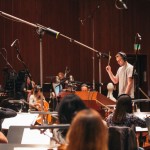I’m still shocked that Dead Space is coming to the Wii. Last year we had a lengthy and interesting chat with Don Veca, Audio Director for the original Dead Space, which turned up all sorts of information about the proprietary sound system they created for the game and some of the technical details of what Dead Space was capable of. With that, I thought it’d be fun to ask about what they were able to accomplish on the Wii.
Overall, it looks like this game is going to sound amazing. While I’ve played it a few times at various events and conventions, background noise has often interfered with my ability to get fully immersed, and even though there isn’t any new music, per se, I’m looking forward to hearing it in a more static format as opposed to the free-range style that we heard in the original game.
Check out our interview with Dead Space Extraction Audio Director Don Veca after the jump.
OSV: Hello Don. It’s been awhile since our original Dead Space interview, and here we are again to talk about a new Dead Space project. This time around, it’s an on-rails shooter. Tell us about yours and the team’s approach given the change in genre.
Veca: One of the main differences for audio in the rail-shooter genre is that things are much more deterministic. We had to have a far more generalized approach for the original Dead Space game, because the audio had to adapt more to the decisions the player made while traversing through the game. On the other hand, the rail-shooter design is much more linear. This means we as developers usually know what’s going to happen at any time, including the exact timing of a lot of things, so we were definitely able to advantage of this sonically. The new design allowed us to approach the sound design a little more like we would for a linear movie.
OSV: Was the game planned to be an on-rails shooter from the beginning? Did you have to change pace to fit the action-oriented shooter model as opposed to the eerie exploration style of the original Dead Space?
Veca: The design vision for Extraction remained consistent from the: start create a game that delivers the same atmosphere created in the original Dead Space. The switch to first person and our guided experience really helped us nail the sound and atmosphere that were critical components in the original Dead Space.
Yes, the pace is a lot different than the original Dead Space. While it looks, sounds, and still has that “Dead Space vibe,” Extraction is really quite a different experience. I have to admit that when I first heard that it was going to be a rail-shooter, I was very skeptical, but the design team definitely proved me wrong. It’s a blast!
OSV: Who is responsible for the sound design and music this time around? Will we see a return of Jason Graves working on the music?
Veca: While Extraction was produced and published by EA Visceral, it was developed by Eurocom in Derby, England. A small Production team from our studio in Redwood City, CA basically moved to Derby for pretty much the entire development period. While I directed and supported the audio team from here and flew out there to work with them for a while, it was the Eurocom audio team’s job to both port the original audio assets to the Wii where it made sense, and to create new content for new creatures, guns, voice-over, etc. This was a daunting task simply because the Wii has much less “audio horse power” than the Xbox 360, PS3, or PC (which is what Dead Space originally shipped on). However, both the original assets and the new assets still had to sound like “Dead Space.” It was my responsible to direct the Eurocom audio team and make sure that all the sound effects and music met the Dead Space quality bar, and also stayed true to the original “Dead Space sound.” It was the Eurocom team’s job to perform a miracle, which they did.
OSV: Will there be any reused material from the first Dead Space, or are we looking at all original sound design and music? Perhaps the main theme will appear in some form?
Veca: We were able to create a huge sound effects and music library during the development of the original Dead Space game, and a significant amount of the audio we created was fairly “generic” to the Dead Space franchise overall. Of course new assets had to be created for new guns, enemies, dialog, etc., that were unique to Extraction, but in most cases the original source assets could (and should) be used. That is, a creature or weapon from the first game should sound the same in the second game. This applied to the music as well. The music (composed by Jason Graves) in the original Dead Space game was written, organized, and formatted in such a way that it could be re-mixed in real-time based on game-play (e.g., “fear-based” mixing). In the first incarnation of Dead Space, the music was constantly being re-combined in different ways based on game-play and was heavily influence by the player’s decisions and technique. This allowed us re-use most of the source music content – but again, in new combinations and variations. The main reason for reusing the original music, however, was that the music from the original Dead Space was a huge part of the overall mood and “aural signature” of the Dead Space franchise. We really wanted Extraction to feel like Dead Space, and by using the same source music, I think we were able to create a sound-scape that is very true to the original game.
OSV: We talked a lot about some of the cool technological things you did on the original Dead Space, much of which was developed in-house by you guys. Given that this title is on the Wii, will we see the same level of technology used to draw players into the game?
Veca: Yes, this was definitely a requirement. Since Eurocom uses their own proprietary game engine, their engineering team had to extend the existing audio system to accommodate the tech we created for Dead Space. Once again, a miracle was performed; they did a great job.
OSV: Will we see a soundtrack release this time around like we did with Dead Space?
Veca: While I wouldn’t rule out an Extraction-specific soundtrack release, no final decision has been made on this yet.
OSV: We forgot to ask last time, but would you mind giving us a little background about yourself? How did you get into game audio of all things?
Veca: I started out as a musician. I just wanted to play jazz (or “Fusion” as we called the new Jazz-Rock thing back in the late 70s/early 80s). Video game audio was the farthest thing from my mind, basically because there was no such thing as video games! So I started off by getting BA in Music from San Jose State University and gigging for a few years. Then this weird thing called “MIDI” came out, and I was intrigued. So, I went back and re-took my Electronic Music class at SJSU, and this time I paid attention! We were using this really funky programming language written in FORTH to control MIDI synthesizers, and it totally blew me away. I was doing experimental, esoteric things like getting a DX7 synth to play Jazz solos over Coltrane changes. From then on, I was totally hooked.
The problem was that game audio was still in its infancy, but worse, I didn’t really know enough about computers. So, I decided to go back to SJSU and get a degree in Computer Science (which was a total bitch, because I had to start from Algebra 1a!). From there, I wound up as a system software tester at Apple computer, where I somehow faked my way into writing test code for the Sound Manager, MIDI Manager, and QuickTime 1.0. Video games were still way off my radar, however, but one day I got a call from a former Apple audio software engineer who had started working at Electronic Arts as a sound designer. He was looking for someone to write audio authoring tools for the new 3DO system that was coming out (remember 3DO, the very first CD-based game system just before the PS1?) He wanted someone with both a technical and music/audio background. Needless to say, I instantly jumped on that one, and have been working in audio here at EA at the same studio ever since. So in the 17 years I’ve been here, I’ve been involved in just about every aspect of game audio, gradually cross-fading from Audio Software Engineer, to Sound Designer, to Music Composer, to Audio Director. It’s certainly been an adventure. But all this is really just a hobby… I’m really a jazz bass player/drummer – just in case the game audio thing doesn’t pan out.
OSV: Do you have any comments for fans of the original Dead Space about what to expect from the audio for Dead Space Extraction? Do you feel that you’ve surpassed what you accomplished in the original?
Veca: So the thing to keep in mind is that the Wii has far less horse-power than the XBox 360 and PS3. The goal for audio on Extraction was to rival the audio quality of the original Dead Space game; to get it to sound like Dead Space but with far less RAM, disk-bandwidth, and CPU power. So while I won’t say that Extraction sounds better than Dead Space, I will say that it’s one of the best-sounding Wii games, if not the best-sounding Wii game I’ve ever heard. And while I supported and directed the audio effort on Extraction, the real credit goes to the fantastic audio team at Eurocom. Those guys did an absolutely amazing job!
OSV: Do you have any thoughts as to what’s next? Are you looking to continue working in the horror shooter realm, or are you looking forward to trying something new?
Veca: At this point Extraction is done, and we’re busy working on the “next big thing” here at Visceral. Another team here at our studio is getting very close to shipping Dante’s Inferno, which by the way looks and sounds absolutely awesome!
OSV: Thanks again for speaking with us. We’re looking forward to playing and hearing Dead Space Extraction.
Tags: Dead Space, Dead Space Extraction, Don Veca, EA, Interviews, Jason Graves, On-Rails Shooter, Scary, Sound Design, Sound Effects, Wii









































[…] Sound Version had an interesting interview with Don Veca, Audio Director for the new Dead Space Extraction (Wii). Last year the had another […]
Really great interview guys, thanks
[…] http://www.originalsoundversion.com/?p=4884. Post Published: 20 April 2010 Author: Mike Niederquell Found in section: Games […]
[…] Read the full interview on the Dead Space audio here. […]